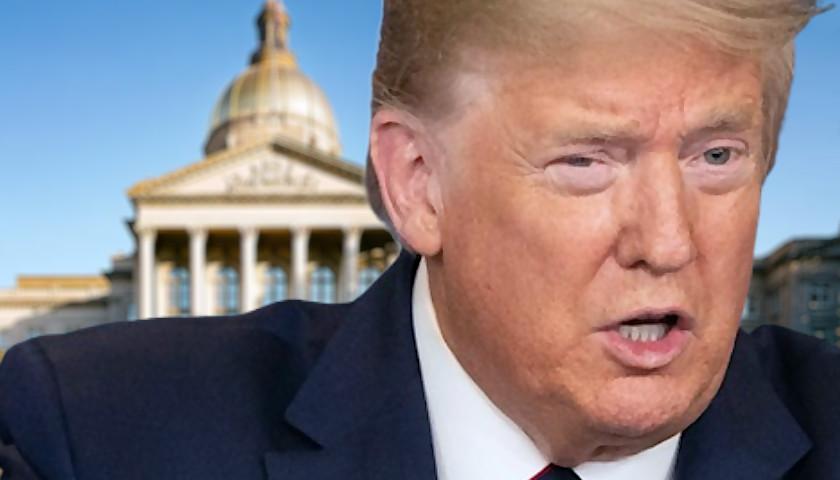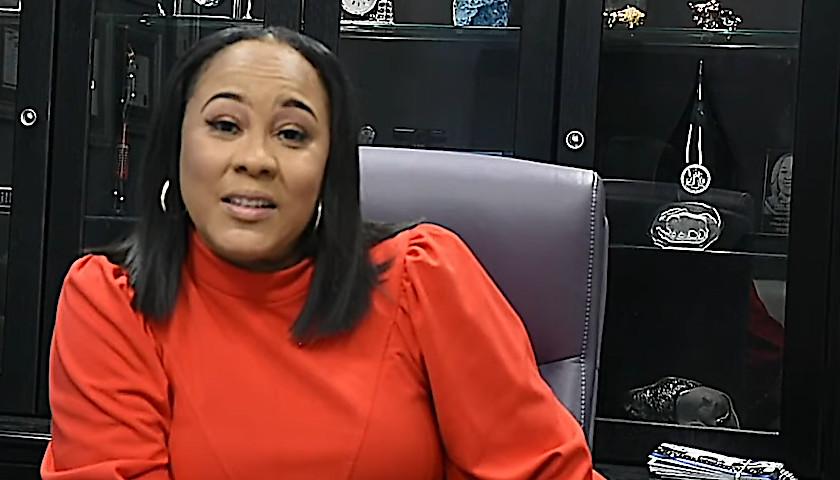Former President Donald Trump made three new legal filings in Georgia on Monday, each requesting on different grounds for Fulton County Superior Court Judge to dismiss the case brought against him by District Attorney Fani Willis (D). In the filings, Trump’s attorney Steve Sadow cites alleged due process and double jeopardy violations, as well as presidential immunity granted by the Supremacy Clause of the U.S. Constitution.
“From 1789 to 2023, no President ever faced criminal prosecution for acts committed while in office,” Sadow noted in his 67-page filing requesting the case be dismissed by Superior Court Judge Scott McAfee due to presidential immunity. “The indictment in this case charges President Trump for acts that lie at the heart of his official responsibilities as President. The indictment is barred by presidential immunity and should be dismissed with prejudice.”
Sadow noted, “Presidential immunity applies regardless of subjective intent,” and further, that “immunity protects a public official from allegations that he or she made false statements in the course of official duties.”
“Historical practice over 234 years confirms that the power to indict a current or former President for official acts does not exist,” the lawyer noted.
In the filing demanding the case be dismissed on due process grounds, Trump’s attorney noted the former president had no reason to believe his actions were illegal, and greatly expand on historical precedent of presidential election contests, which Sadow explained date to the 19th century.
By way of example, the filing explains, “in the disputed elections of both 1876 and 1960, competing slates of electors were sent to Congress.” In the contested 1960 election, the attorneys emphasize, both Republican and Democratic electors from Hawaii cast votes, despite only the Republican electors holding a certificate of election from the Hawaii government.
“In the 2000 election contest between President George W. Bush and Vice President Al Gore, three Supreme Court justices pointed to the Hawaii situation in 1960 to emphasize that competing slates of electors could be submitted to Congress and that Congress could make the decision on which slate to accept,” the filing notes.
Though most of the defendants have argued the alternate slate of electors was only assembled to preserve Trump’s court cases regarding the election, Willis claims the alternative electors were fraudulently presenting themselves as government officials.
“President Trump is the first person to face criminal charges for such core political behavior, and he is charged under statutes that facially have nothing to do with his alleged conduct. As a result, President Trump could not possibly have received fair notice that his conduct was allegedly criminal when he performed it, and the indictment must be dismissed for violation of the fair notice of the Due Process Clause.”
In the third filing requesting the case be dropped, Trump’s lawyer noted the former president was acquitted by the U.S. Senate for his contest of the 2020 election, and argued he cannot face a second trial in Fulton County over the same actions.
Sadow argued, “Because the Constitution specifies” only a former president who was convicted “in the Senate may be ‘liable and subject to Indictment, Trial, Judgment, and Punishment,” a president who is not convicted by the U.S. Senate cannot be prosecuted in a criminal court.
Trump also argued he has presidential immunity in special prosecutor Jack Smith’s federal case against him, though it was quickly denied by Judge Tanya Chutkan. The former president appealed the decision, and Smith asked the U.S. Supreme Court to immediately weigh in on the former president’s legal immunity, but the court declined. Chutkan has paused all proceedings in the case until after Trump’s appeal is decided.
– – –
Tom Pappert is the lead reporter for The Tennessee Star, and also reports for The Georgia Star News, The Virginia Star, and The Arizona Sun Times. Follow Tom on X/Twitter. Email tips to [email protected].





